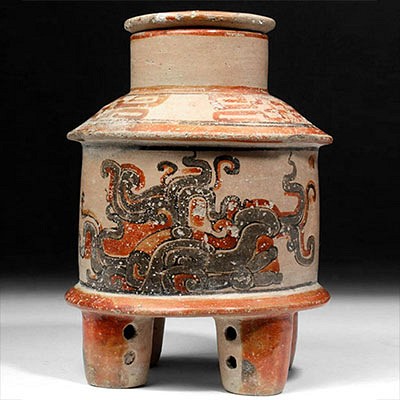Tall 19th C. African Dogon Wood Ladder
Lot 266
About Seller
Artemis Gallery
686 S Taylor Ave, Ste 106
Louisville, CO 80027
United States
Selling antiquities, ancient and ethnographic art online since 1993, Artemis Gallery specializes in Classical Antiquities (Egyptian, Greek, Roman, Near Eastern), Asian, Pre-Columbian, African / Tribal / Oceanographic art. Our extensive inventory includes pottery, stone, metal, wood, glass and textil...Read more
Estimate:
$2,000 - $3,000
Absentee vs Live bid
Two ways to bid:
- Leave a max absentee bid and the platform will bid on your behalf up to your maximum bid during the live auction.
- Bid live during the auction and your bids will be submitted real-time to the auctioneer.
Bid Increments
| Price | Bid Increment |
|---|---|
| $0 | $25 |
| $300 | $50 |
| $1,000 | $100 |
| $2,000 | $250 |
| $5,000 | $500 |
| $10,000 | $1,000 |
| $20,000 | $2,500 |
| $50,000 | $5,000 |
| $100,000 | $10,000 |
| $200,000 | $20,000 |
About Auction
By Artemis Gallery
Jul 22, 2021
Set Reminder
2021-07-22 10:00:00
2021-07-22 10:00:00
America/New_York
Bidsquare
Bidsquare : Summer Antiquities & Ethnographic Art Auction
https://www.bidsquare.com/auctions/artemis-gallery/summer-antiquities-ethnographic-art-auction-7245
Travel around the world and back in time...and be amazed at the treasures you will find! Antiquities from Egypt, Greece, Italy and the Near East, Asian, Pre-Columbian, African / Tribal / Oceanic, Native American, Spanish Colonial, Russian Icons, Fossils, Fine Art, much more! Artemis Gallery info@artemisgallery.com
Travel around the world and back in time...and be amazed at the treasures you will find! Antiquities from Egypt, Greece, Italy and the Near East, Asian, Pre-Columbian, African / Tribal / Oceanic, Native American, Spanish Colonial, Russian Icons, Fossils, Fine Art, much more! Artemis Gallery info@artemisgallery.com
- Lot Description
West Africa, Mali, Dogon, ca. 19th to 20th century CE. A hand-carved ladder formed from a naturally forked branch or tree trunk, with six notches carved onto the main body. The tips of the fork have been shaved, and this cleft would function as a handhold if this ladder was used as intended. Such ladders may have been used daily for accessing the house or granary, but ladders also served a votive function. Ritualistically, ladders like this were leaned against the family altar, wherein the spirit of their ancestral head would lie, so that the chiefs of the family as well as the spirits of their deceased ancestors could climb the carved notches in order to reach the realm of the afterlife. This piece has developed a nice weathered appearance over the course of its history! Size: 14" W x 69" H (35.6 cm x 175.3 cm)
Provenance: private Houston, Texas, USA collection, purchased from dealers, beginning in the late 1980s to as recently as 2017
All items legal to buy/sell under U.S. Statute covering cultural patrimony Code 2600, CHAPTER 14, and are guaranteed to be as described or your money back.
A Certificate of Authenticity will accompany all winning bids.
PLEASE NOTE: Due to recent increases of shipments being seized by Australian & German customs (even for items with pre-UNESCO provenance), we will no longer ship most antiquities and ancient Chinese art to Australia & Germany. For categories of items that are acceptable to ship to Australia, please contact us directly or work with your local customs brokerage firm.
#163120Nicks, chips, and cavities. Losses to verso. Old inactive insect cavities. Stable pressure cracks and fissures. Weathering and patina from age and use.Condition
- Shipping Info
-
All shipping is handled in-house for your convenience. Your invoice from Artemis Gallery will include shipping calculation instructions. If in doubt, please inquire BEFORE bidding for estimated shipping costs for individual items.
-
- Buyer's Premium



 EUR
EUR CAD
CAD AUD
AUD GBP
GBP MXN
MXN HKD
HKD CNY
CNY MYR
MYR SEK
SEK SGD
SGD CHF
CHF THB
THB












